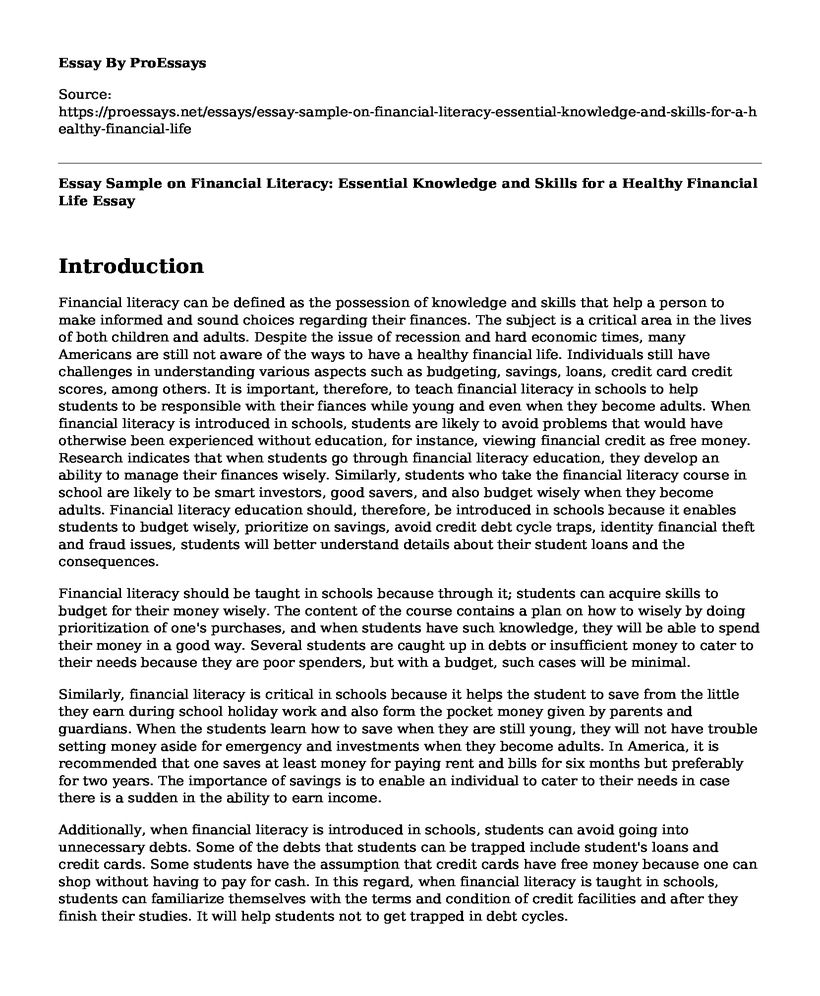Introduction
Financial literacy can be defined as the possession of knowledge and skills that help a person to make informed and sound choices regarding their finances. The subject is a critical area in the lives of both children and adults. Despite the issue of recession and hard economic times, many Americans are still not aware of the ways to have a healthy financial life. Individuals still have challenges in understanding various aspects such as budgeting, savings, loans, credit card credit scores, among others. It is important, therefore, to teach financial literacy in schools to help students to be responsible with their fiances while young and even when they become adults. When financial literacy is introduced in schools, students are likely to avoid problems that would have otherwise been experienced without education, for instance, viewing financial credit as free money. Research indicates that when students go through financial literacy education, they develop an ability to manage their finances wisely. Similarly, students who take the financial literacy course in school are likely to be smart investors, good savers, and also budget wisely when they become adults. Financial literacy education should, therefore, be introduced in schools because it enables students to budget wisely, prioritize on savings, avoid credit debt cycle traps, identity financial theft and fraud issues, students will better understand details about their student loans and the consequences.
Financial literacy should be taught in schools because through it; students can acquire skills to budget for their money wisely. The content of the course contains a plan on how to wisely by doing prioritization of one's purchases, and when students have such knowledge, they will be able to spend their money in a good way. Several students are caught up in debts or insufficient money to cater to their needs because they are poor spenders, but with a budget, such cases will be minimal.
Similarly, financial literacy is critical in schools because it helps the student to save from the little they earn during school holiday work and also form the pocket money given by parents and guardians. When the students learn how to save when they are still young, they will not have trouble setting money aside for emergency and investments when they become adults. In America, it is recommended that one saves at least money for paying rent and bills for six months but preferably for two years. The importance of savings is to enable an individual to cater to their needs in case there is a sudden in the ability to earn income.
Additionally, when financial literacy is introduced in schools, students can avoid going into unnecessary debts. Some of the debts that students can be trapped include student's loans and credit cards. Some students have the assumption that credit cards have free money because one can shop without having to pay for cash. In this regard, when financial literacy is taught in schools, students can familiarize themselves with the terms and condition of credit facilities and after they finish their studies. It will help students not to get trapped in debt cycles.
In the current era of technological advancement, several cases have been reported regarding theft and financial fraud. There is a need for financial literacy to enable students to be aware of the different ways which might be used by thieves and fraudsters. When students have knowledge and skills regarding how to keep their bank account information private, then they will not fall victims of conmen.
Financial literacy will also help students to understand the consequences of student loans before and after school. Students need to be aware that a loan advanced to them while in school is subject to payment after they are done with school. In this regard, they need to know that they already have a liability in case they take such loans, and failure to repay will affect their credit scores denying them a chance to take other loans such as a mortgage when they become adults. There are times when students are not aware that they need to repay the student loans and that if they fail lit will have their record hindering them from obtaining other important credit facilities.
Financial literacy in school lays a foundation in students that will enable them to make sound financial decisions in school and as adults. It is necessary because it will help them in matters regarding budgeting, savings, debt management, understanding the consequences of student loans, and being aware of theft and financial fraud. It is a subject that should be made mandatory in schools to help students have good management of their funds in school and after studies are complete. It is a course that needs to be taught to enable students to make wise decisions in bad economic times and also to help them in investing in viable projects.
Work Cited
Concordia University. Three Reasons Teachers Should be Teaching Financial Literacy https://education.cu-portland.edu/blog/classroom-resources/three-reasons-teachers-should-teach-financial-literacy/
Hoyt, Elizabeth. The 5 Key Components of Financial Literacy https://www.fastweb.com/student-life/articles/the-5-key-components-of-financial-literacyMandell, Lewis, and Kermit O. Hanson. "The impact of financial education in high school and college on financial literacy and subsequent financial decision making." American Economic Association Meetings, San Francisco, CA. Vol. 51. 2009.
Cite this page
Essay Sample on Financial Literacy: Essential Knowledge and Skills for a Healthy Financial Life. (2023, Feb 12). Retrieved from https://proessays.net/essays/essay-sample-on-financial-literacy-essential-knowledge-and-skills-for-a-healthy-financial-life
If you are the original author of this essay and no longer wish to have it published on the ProEssays website, please click below to request its removal:
- Research Paper on Impact of ISO Regulations on Stakeholders in Saudi Arabia
- Facts About Mobile Banking and Budgeting
- Paper Example on Funding Education: A Cost-Benefit Analysis
- Essay Example on Premiums & Rates: Essential for Insuring Profit & Loss
- Free Report Example on Improving Living Standards Through Adequate Housing
- Cutback Mgmt: Addressing Strategies in Resource Scarcity Paper Example
- Exploring Abroad on a Budget: Tips for Smart Travelers - Free Essay Example







